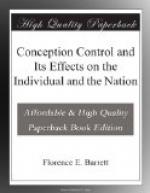Now it is quite true that a small family instead of a large one will diminish the work and anxieties of such a mother, but it will not give her the remedies which she needs, nor will it diminish the excessive sexual demands made upon her.
Everyone who knows these women intimately realises what an exhausting feature is this habit of excess due to lack of knowledge or self-restraint on the part of the husband.
I believe if facilities were provided whereby the woman could do her laundry with modern appliances outside her own home, if family meals were arranged in service rooms equivalent to the arrangements in service flats, and if there were creche rooms where children might be left for an hour or two in safety while necessary work was done—we should find a greatly increased standard of comfort even in existing homes, and a great improvement in dietary for the whole family. Such relief, added to teaching both to husband and wife as to the times of conception, would revolutionise the life of women more than any teaching of artificial birth control, and would lift it up to a higher level instead of degrading it to the grossly physical.
We come to very different considerations in group 4, p. 18, where choice rather than necessity impels the parents to limitation of the family. The teaching now being advocated by certain books and pamphlets advises deliberate delay in child-bearing for a period after marriage, and the spacing of certain periods between the births of such children as are allowed to come into the world, with limitation of the number in each family.
Teaching on these lines, if followed, would involve an artificial mode of sex life always—natural spontaneous union would find no place. Already young wives are seeking advice for some relief from methods of preparation which they say have destroyed in them all spontaneous desire. The tragedy of it all is that even to attain the end in view—moderation in the size of families—such methods are to a large extent unnecessary. Not to every young married couple does a child arrive at the end of a year. Some, using no artificial checks, wait two or three years before the first baby comes. Even if it does come, however, at the end of a year, there are many advantages to counterbalance the small means and perhaps hard living of the young pair. For when people are young they can put up with small means, because they are strong enough to work hard and help each other; indeed, the demand for little work and many luxuries in youth is not a healthy one, it is a sign of decadence in the race.
Moreover, even though an early family involve real hardship for awhile, it has the great advantage that parents and children later on are still young together, and that means far more to the child in understanding friendship and helpfulness during the most critical period of life than extra comforts or pleasures would have meant to the parents, and if young parents realised this, would they not put the child first?




